#Dorotheus of Gaza
Text
“Imagine that the world is a circle, that God is the center, and that the radii are the different ways human beings live. When those who wish to come closer to God walk towards the center of the circle, they come closer to one another at the same time as to God. The closer they come to God, the closer they come to one another. And the closer they come to one another, the closer they come to God.”
— St. Dorotheus of Gaza
463 notes
·
View notes
Text
2023 AUGUST 28 Monday
"So it is, my brethren, when a man or woman has not the guts to accuse themselves, they do not scruple to accuse others or God Himself, and neither the one nor the other stooped in self-accusation. But come, change your ways. Live through lowliness of mind instead of going to your death through pretentious pride."
~ Dorotheus of Gaza, Instructions, I, § 8-9 ; SC 92
#bible#gospel#further reading#Dorotheus of Gaza#Instructions#so it is#brethren#man#woman#no#guts#accuse#self#do not#scruple#others#God#Lord#Jesus#Christ#neither#stooped#self-accusation#come#change#ways#live#lowliness#mind#instead
0 notes
Text
"Everyone that desires salvation must not only avoid evil, but is obliged to do good, just as it says in the Psalm: "Depart from evil and do good" (Psalm 34:14). For example, if somebody was angry, he must not only not get angry, but also become meek; if somebody was proud, he must not only refrain from being proud but also become humble. Thus, every passion has an opposing virtue: pride — humility, stinginess — charity, lust — chastity, faintheartedness — patience, anger — meekness, hatred — love."
- St Dorotheus of Gaza
97 notes
·
View notes
Text

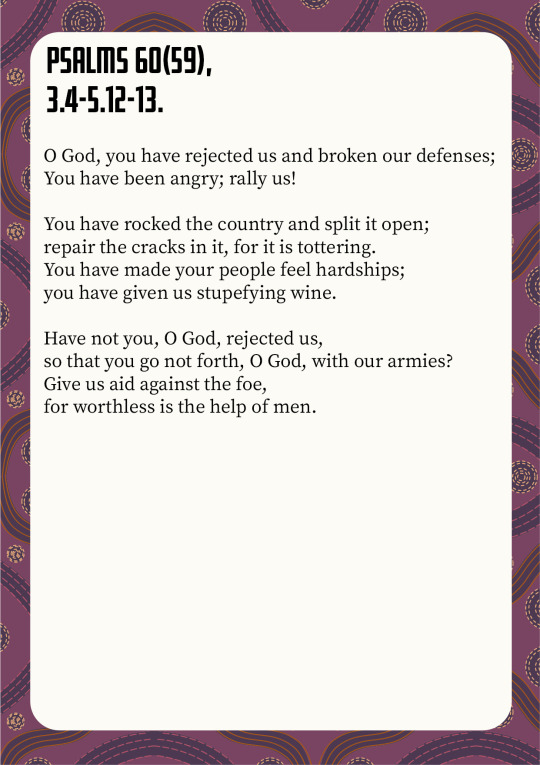


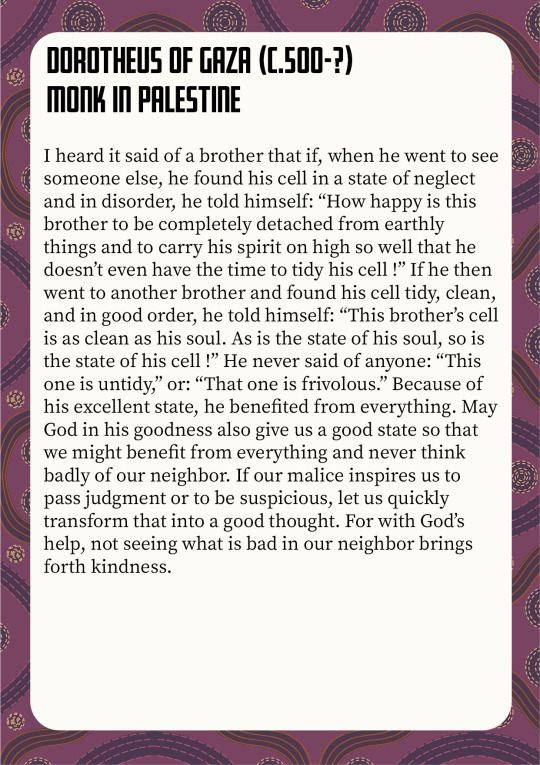
Readings for 20 June
20/06/2022
#2nd book of Kings 17#2nd book of Kings#Psalms 60(59)#Psalms#Holy Gospel of Jesus Christ according to Saint Matthew 7#Holy Gospel of Jesus Christ according to Saint Matthew#Dorotheus of Gaza (c.500-?)#“Then you will see clearly”#God#Lord#Jesus#Holy Spirit#love#hope#life#peace
1 note
·
View note
Photo
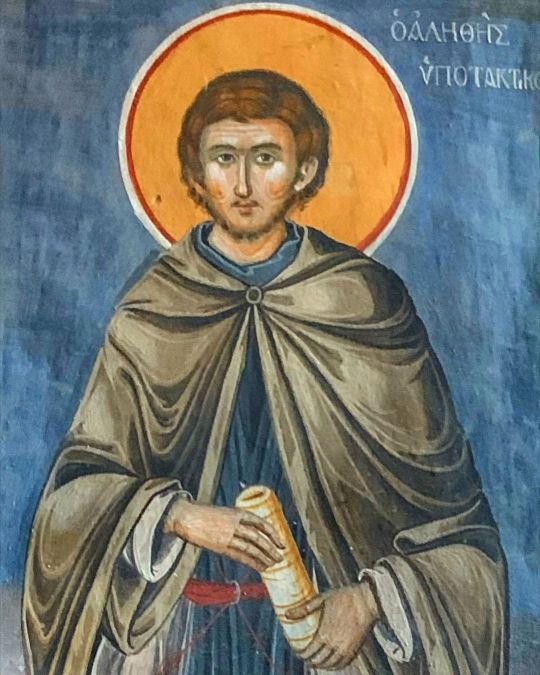
Today we also celebrate our Venerable Father Dositheus of Gaza. Saint Dositheus, a disciple of Saint Abba Dorotheus (June 5), lived during the sixth-seventh centuries, and was raised in a rich and renowned family. Young Dositheus listened to tales of the holy city of Jerusalem from the servants of his grandfather, a military commander, and this kindled within him the desire to go there. Soon his wish came true. At Gethsemane, he gazed for a long time at a picture of the Dread Last judgment. Suddenly he saw beside him a woman, who explained to him what was depicted in the image. The youth asked, “How is it possible to avoid the eternal torments?” She replied, “Fast, do not eat meat, and pray constantly to God.” After this, his strange guide suddenly became invisible. She who conversed with him had been the Most Holy Theotokos. The appearance of the Mother of God produced a strong impression on the youth, and he decided to enter a monastery headed by Abba Seridus (August 13), and populated by such great ascetics as Saints Barsanuphius (February 6) and John (June 19). Dositheus, asking to be accepted among the brethren, was sent to the Elder Dorotheus. Saint Dositheus fulfilled his obedience in the monastery infirmary, caring for all the sick. Saint Dorotheus trained his disciple in abstinence and fasting, gradually decreasing the quantity of food he consumed each day. He also weaned the youth from vexation and anger, by constantly reminding him that every unkind word said to a sick person, is said to Jesus Christ Himself. By revealing his thoughts to the Elder and through unhesitating obedience, Saint Dositheus liberated his soul from passions. After five years of tending the sick and obeying his Elder, Saint Dositheus fell into serious sickness. Patiently enduring his sufferings, he prayed constantly and never complained. (Cont.) (at Gaza,Palestine) https://www.instagram.com/p/Co0FmFILhwx/?igshid=NGJjMDIxMWI=
11 notes
·
View notes
Text
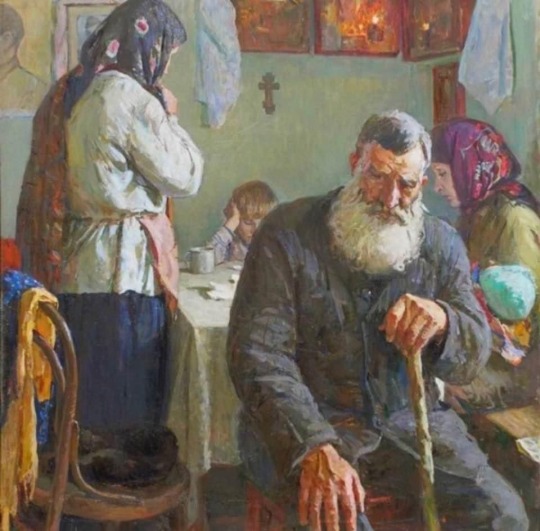
Spiritual death, expressed as biological death, secretly eats away at our existence. Yet, by the very intensity of the anguish it provokes, it can set us on the path of awakening. The fickleness of time and the precariousness of an existence in which everything eludes us is something that is repeatedly emphasized by St Andrew of Crete in his Great Canon: The time of my life is short, filled with trouble and evil (4.32); The end draws near, my soul, the end draws near for the days of our life pass swiftly, as a dream, as a flower (4.11); My life is dead, it is petering out and my mind is wounded, my body has grown feeble, my spirit is sick, my speech has lost its power (9.10).
Thus we become aware of a fundamental emptiness and a sense of failure. St Andrew alludes several times to this background of anguish. Feelings of revulsion and yet a melancholic nostalgia take hold of us when we come to realize the hollowness of our preoccupations, the emptiness of the hustle and bustle and the many concerns and preoccupations in which we seek refuge so as to forget our finiteness. My days have vanished as the dream of one awaking (7.20); I speak boastfully, with boldness of heart, yet all to no purpose and in vain (4.33). That is to say, out of a laughable self-importance or, even more tritely, out of the dreary despondency that is so characteristic of our thoroughly nihilistic age. This is argia, the “sloth” or “idleness” spoken of in the prayer that is recited so frequently in Lent, the Prayer of St Ephraim: “O Lord and Master of my life, give me not a spirit of sloth . . .” Argia, say the ascetics of old, begets forgetfulness, one of the “giants” of sin: forgetfulness of God and thus of oneself and of the other in his mystery; forgetfulness of the truth about beings and things—a sort of sleepwalking filled with fantasies in which the soul, as it were, splinters, breaks up, splits into two. It is precisely this dipsychia, this double-mindedness that the Epistle of St James 1:8 describes as the major sin. In fragmenting, the soul falls prey to the demon whose name is Legion (Mk 5.9). The same night that falls perceptibly with the approach of death had long since begun to enshroud our life, rising from the cracks and the chaos: In night have I passed all my life; for the night of sin has covered me with darkness and thick mist (5.1). A layer of filth encrusts the soul, hardening the heart and rendering it heavy and insensitive: I have defiled my body, I have stained my spirit (392). We have a sense of foreboding that maleficent powers are on the look-out, and that in the shadows the Enemy lurks with his perverted intelligence. The Enemy—that deceiver, that beguiler, that separator:Let me not become the possession and food of the enemy, we pray four times in Ode Four (4.32, 34, 35, 36).
Then, a first blessing is given: the “remembrance of death.” St John Climacus advises us—monks in particular—to make the constant thought of death our “spouse.” In the sobering light of this “remembrance,” our conscience begins to awaken, regardless of our conditioning or our instinct for self-preservation. Solzhenitsyn has shown how the experience of the camps—where the remembrance of death was inescapable—can indeed awaken the conscience. I am convicted by the verdict of my own conscience, which is more compelling than all else in the world (4.14). For several of the Fathers—Dorotheus of Gaza, for example - the conscience is like a divine spark. Thus man is judged from within, and with no possibility of appeal, by his own conscience. He then becomes aware not only that he “sits in darkness and the shadow of death” (Lk 1.79), but that in a certain sense he is in hell; for hell, as Origen said, is precisely the burning sensation caused by one’s own conscience. There remains a certain persistent hunger. I am barren of the virtues of holiness; in my hunger I cry out (1.21).
There remains a certain desire, though it has been disappointed for so long by the fantasies we have projected onto the wall of our finiteness. And so, the understanding and the heart begin to undergo change. This is the real meaning of metanoia, which is too often translated as “repentance” but which in fact signifies the transformation of our entire grasp of reality. We begin to shake off our torpor, our self-sufficiency, and that habit of perpetually justifying ourselves by condemning others. It is a return to one’s true self, which becomes a return to God and which manifests itself in confession: With boldness tell Christ of thy deeds and thoughts (4.12); Turn back, repent, uncover all that thou hast hidden. Say unto God, to whom all things are known: Thou alone knowest my secrets, O Savior; “have mercy on me,” as David sings, “according to thy mercy” (7.19).
Olivier Clement
Song of Tears
Chapter I, Part I: Awakening and the Fear of God
15 notes
·
View notes
Text
Saints&Reading: Monday, February 19,2024
february 6_february 19
THE MONKS BARSONOPHIOS THE GREAT AND JOHN THE PROPHET OF PALESTINE ( 6th.c.)
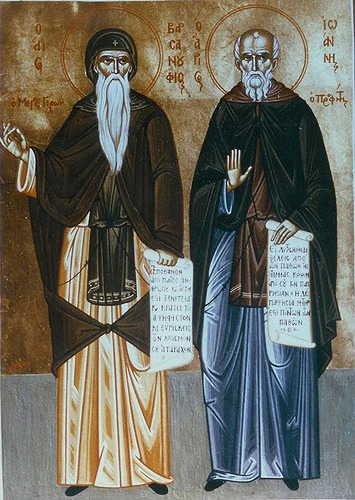
Saints Barsanuphius the Great and John the Prophet lived in the sixth century under the reign of the emperor Justinian I (483-565). they were both ascetic at the monastery of Abba Seridus in Palestine, near the city of Gaza.
Saint Barsanuphius was born in Egypt (the year of his birth is unknown). From his youth, he began to lead an ascetic life. Arriving at the cenobitic monastery of Abba Seridus, he built a small cell outside the monastery. Here he lived in solitude.
Later, Saint John, disciple of Saint Barsanuphius, lived in this cell for eighteen years until his death. Saint John imitated his teacher in silence, ascetic deeds and in virtue. Because of his gift of clairvoyance, he was known as “the Prophet.”
After a certain time, Saint Barsanuphius built another cell near the monastery. At the beginning of his solitude, the monastery sent him only three loaves of bread per week. He dwelt for fifty years in work and ascetic deeds.
When Patriarch Eustochios of Jerusalem heard about the ascetical life of Saint Barsanuphius, it seemed unbelievable to him. He wanted to see Barsanuphius for himself, so he and his companions tried to dig under the wall, and to enter the monk’s cell from beneath. Those attempting to enter were almost burned by flames suddenly bursting forth from the cell.
In his hermitage Saint Barsanuphius devoted himeself entirely to prayer, and he attained a high degree of spiritual perfection. We have manuscript accounts about the life, the deeds and talents of Saints Barsanuphius and John. During the lifetime of Saint Paisius Velichkovsky (November 15), they were translated into the Moldavian and Slavonic languages. The publication of these manuscripts, and also their translation into the Russian language, was done in the nineteenth century by the Elders of Optina’s Entry of the Theotokos Monastery.
The precepts of Saints Barsanuphius and John clearly show the degree of their moral perfection, and their love for people, but contain scant facts about their lives. We do not know exactly when Saint Barsanuphius died. Some sources say the year of his death was 563, others say more cautiously before the year 600.
After spending a long time in seclusion, Saint Barsanuphius thereafter and until the death of Saint John the Prophet began to serve others by instructing them on the path to salvation, as Abba Dorotheus (June 5) testifies. Saint Barsanuphius replied to questioners through Saint John, sometimes instructing him to give the answers, or even through Abba Seridus (August 13), who wrote down the saint’s answers.
In the answers of Saints Barsanuphius and John the Prophet, who were guides in the spiritual life not only for their contemporaries, but also for succeeding generations, it is clearly possible to see the monks’ gradual spiritual ascent “from strength to strength.”
By deeds of fasting, silence, guarding the heart, and unceasing prayer, Saint Barsanuphius attained the heights of humility, reasoning and fiery love. The Lord gave him the gifts of discernment, clairvoyance, and wonderworking. By the power of his prayers, he was able to free the souls of people from sins. Sometimes, he took the sins of others upon himself.
The venerable one knew the dispositions of hearts, therefore he gave advice according to the spiritual state of each person. In the Name of the Lord he raised the dead, he cast out demons, and healed incurable illnesses. Things that he blessed received divine power and grace (for example, kukol or furrow-weed took away a monk’s headache). Even the name of Abba Barsanuphius, when invoked mentally, gave help to those who called upon it.
Through the prayers of Saint Barsanuphius, God sent rain upon the earth, withdrawing His wrath from the multitudes of the people. The saint’s predictions always came true. Thus, he predicted that a certain monk, the Elder Euthymius the Silent, would be placed with him in a single grave, which indeed came to pass.Saint Barsanuphius acquired these gifts after many years of patiently enduring great temptations and illness.
(Besides the Orthodox ascetic Barsanuphius the Great, there was another Barsanuphius, a Monophysite heretic. Sophronius, Patriarch of Jerusalem, anathematized him in his “Confession of Faith,” sent to the Sixth Ecumenical Council).
We do not know when Saint Barsanuphius arrived at the monastery of Abba Seridus, nor anything about the home and family of Saint John the Prophet. Following the instructions of Saint Barsanuphius, John attained the heights of perfection, and became like his teacher in all things. Out of humility, he sent those who came to him with questions to Abba Barsanuphius.
Saint John foresaw and predicted many things, even his own death a week after the death of Abba Seridus. Abba Elian, the young igumen of this monastery, begged John to remain with him for two more weeks, in order to teach him the Rule and how to govern the monastery. Saint John fulfilled his request and died after two weeks.
Saint Barsanuphius the Great survived his disciple and friend, but after St. John's death embraced complete silence and refused to give answers to anyone. These two ascetics have left the soul-profiting book, GUIDANCE TOWARD SPIRITUAL LIFE: ANSWERS TO THE QUESTIONS OF DISCIPLES by the Holy Monastic Fathers Barsanuphius and John as their spiritual legacy. This book was known to many saints who lived at a later time, as evidenced by the wrings of Saint Theodore the Studite (November 11 and January 26), the hieromonk Nikon Chernogorets (+ 1060), Saint Simeon the New Theologian (March 12), and other Orthodox ascetics and writers.
SAINT PHOTIOS, PATRIARCH OF CONSTANTINOPLE (891)
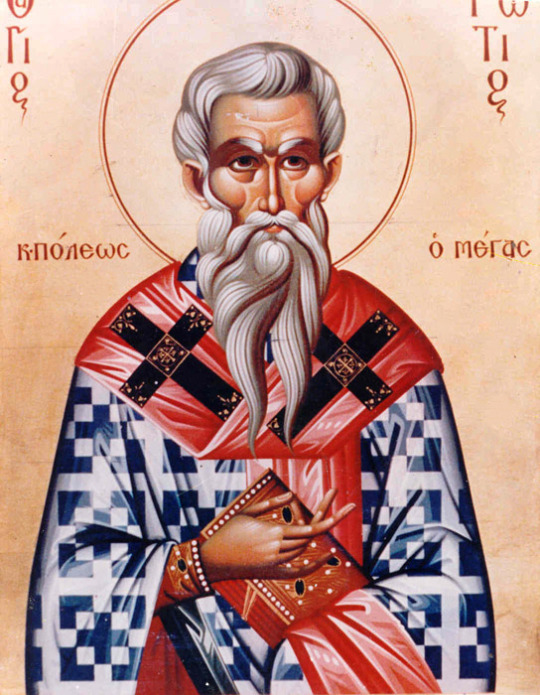
Saint Photius, Patriarch of Constantinople, “the Church’s far-gleaming beacon,” lived during the ninth century, and came from a family of zealous Christians. His father Sergius died as a martyr in defense of holy icons. Saint Photius received an excellent education and, since his family was related to the imperial house, he occupied the position of first state secretary in the Senate. His contemporaries said of him: “He so distinguished himself with knowledge in almost all the secular sciences, that it rightfully might be possible to take into account the glory of his age and compare it with the ancients.”
Michael, the young successor to the throne, and Saint Cyril, the future Enlightener of the Slavs, were taught by him. His deep Christian piety protected Saint Photius from being seduced by the charms of court life. With all his soul, he yearned for monasticism.
In 857 Bardas, who ruled with Emperor Michael, deposed Patriarch Ignatius (October 23) from the See of Constantinople. The bishops, knowing the piety and extensive knowledge of Photius, informed the emperor that he was a man worthy to occupy the archpastoral throne. Saint Photius accepted the proposal with humility. He passed through all the clerical ranks in six days. On the day of the Nativity of Christ, he was consecrated bishop and elevated to the patriarchal throne.
Soon, however, discord arose within the Church, stirred up by the removal of Patriarch Ignatius from office. The Synod of 861 was called to end the unrest, at which the deposition of Ignatius and the installation of Photius as patriarch were confirmed.
Pope Nicholas I, whose envoys were present at this council, hoped that by recognizing Photius as patriarch he could subordinate him to his power. When the new patriarch proved unsubmissive, Nicholas anathematized Photius at a Roman council.
Until the end of his life Saint Photius was a firm opponent of papal intrigues and designs upon the Orthodox Church of the East. In 864, Bulgaria voluntarily converted to Christianity. The Bulgarian prince Boris was baptized by Patriarch Photius himself. Later, Saint Photius sent an archbishop and priests to baptize the Bulgarian people. In 865, Saints Cyril and Methodius were sent to preach Christ in the Slavonic language. However, the partisans of the Pope incited the Bulgarians against the Orthodox missionaries.
The calamitous situation in Bulgaria developed because an invasion by the Germans forced them to seek help in the West, and the Bulgarian prince requested the Pope to send his bishops. When they arrived in Bulgaria, the papal legates began to substitute Latin teachings and customs in place of Orthodox belief and practice. Saint Photius, as a firm defender of truth and denouncer of falsehood, wrote an encyclical informing the Eastern bishops of the Pope’s actions, indicating that the departure of the Roman Church from Orthodoxy was not only in ritual, but also in its confession of faith. A council was convened, censuring the arrogance of the West.
In 867, Basil the Macedonian seized the imperial throne, after murdering the emperor Michael. Saint Photius denounced the murderer and would not permit him to partake of the Holy Mysteries of Christ. Therefore, he was removed from the patriarchal throne and locked in a monastery under guard, and Patriarch Ignatius was restored to his position.
The Synod of 869 met to investigate the conduct of Saint Photius. This council took place with the participation of papal legates, who demanded that the participants sign a document (Libellus) condemning Photius and recognizing the primacy of the Pope. The Eastern bishops would not agree to this, and argued with the legates. Summoned to the council, Saint Photius met all the accusations of the legates with a dignified silence. Only when the judges asked him whether he wished to repent did he reply, “Why do you consider yourselves judges?” After long disputes, the opponents of Photius were victorious. Although their judgment was baseless, they anathematized Patriarch Photius and the bishops defending him. The saint was sent to prison for seven years, and by his own testimony, he thanked the Lord for patiently enduring His judges.
During this time the Latin clergy were expelled from Bulgaria, and Patriarch Ignatius sent his bishops there. In 879, two years after the death of Patriarch Ignatius, another council was summoned (many consider it the Eighth Ecumenical Council), and again Saint Photius was acknowledged as the lawful archpastor of the Church of Constantinople. Pope John VIII, who knew Photius personally, declared through his envoys that the former papal decisions about Photius were annulled. The council acknowledged the unalterable character of the Nicean-Constantinople Creed, rejecting the Latin distortion (“filioque”), and acknowledging the independence and equality of both thrones and both churches (Western and Eastern). The council decided to abolish Latin usages and rituals in the Bulgarian church introduced by the Roman clergy, who ended their activities there.
Under Emperor Basil’s successor, Leo, Saint Photius again endured false denunciations, and was accused of speaking against the emperor. Again deposed from his See in 886, the saint completed the course of his life in 891. He was buried at the monastery of Eremia.
The Orthodox Church venerates Saint Photius as a “pillar and foundation of the Church,” an “inspired guide of the Orthodox,” and a wise theologian. He left behind several works, exposing the errors of the Latins, refuting soul-destroying heresies, explicating Holy Scripture, and exploring many aspects of the Faith.


1 PETER 2:21-3:9
21 For to this you were called, because Christ also suffered for us, leaving us an example, that you should follow His steps: 22 Who committed no sin, Nor was deceit found in His mouth"; 23 who, when He was reviled, did not revile in return; when He suffered, He did not threaten, but committed Himself to Him who judges righteously; 24 who Himself bore our sins in His own body on the tree, that we, having died to sins, might live for righteousness-by whose stripes you were healed. 25 For you were like sheep going astray, but have now returned to the Shepherd and Overseer of your souls.
1 Wives, likewise, be submissive to your own husbands, that even if some do not obey the word, they, without a word, may be won by the conduct of their wives, 2 when they observe your chaste conduct accompanied by fear. 3 Do not let your adornment be merely outward-arranging the hair, wearing gold, or putting on fine apparel- 4 rather let it be the hidden person of the heart, with the incorruptible beauty of a gentle and quiet spirit, which is very precious in the sight of God. 5 For in this manner, in former times, the holy women who trusted in God also adorned themselves, being submissive to their own husbands, 6 as Sarah obeyed Abraham, calling him lord, whose daughters you are if you do good and are not afraid with any terror. 7 Husbands, likewise, dwell with them with understanding, giving honor to the wife, as to the weaker vessel, and as being heirs together of the grace of life, that your prayers may not be hindered. 8 Finally, all of you be of one mind, having compassion for one another; love as brothers, be tenderhearted, be courteous; 9 not returning evil for evil or reviling for reviling, but on the contrary blessing, knowing that you were called to this, that you may inherit a blessing.
MARK 12:13-17
13 Then they sent to Him some of the Pharisees and the Herodians, to catch Him in His words. 14 When they had come, they said to Him, "Teacher, we know that You are true, and care about no one; for You do not regard the person of men, but teach the way of God in truth. Is it lawful to pay taxes to Caesar, or not? 15 Shall we pay, or shall we not pay? But He, knowing their hypocrisy, said to them, "Why do you test Me? Bring Me a denarius that I may see it." 16 So they brought it. And He said to them, "Whose image and inscription is this?" They said to Him, "Caesar's." 17 And Jesus answered and said to them, "Render to Caesar the things that are Caesar's, and to God the things that are God's." And they marveled at Him.
#orthodoxy#orthodoxchristianity#easternorthodoxchurch#originofchristianity#spirituality#holyscriptures#gospel#bible#wisdom#saints
0 notes
Text
Barsanuphius the Great and John of Gaza
Reading from the Synaxarion:
Saint Barsanuphius the Great, who was from Egypt, and his disciple, Saint John the Prophet, struggled in very strict reclusion during the sixth century at the monastery of Abba Seridus at Gaza of Palestine, and were endowed with amazing gifts of prophecy and spiritual discernment. They are mentioned by Saint Dorotheus of Gaza, their disciple, in his writings. Many of the counsels they sent to Christians who wrote to them are preserved in the book which bears their names. Once certain of the Fathers besought Saint Barsanuphius to pray that God stay His wrath and spare the world. Saint Barsanuphius wrote back that there were "three men perfect before God," whose prayers met at the throne of God and protected the whole world; to them it had been revealed that the wrath of God would not last long. These three, he said, were "John of Rome, Elias of Corinth, and another in the diocese of Jerusalem," concealing the name of the last, since it was himself.
Apolytikion of Ba rsanuphius & John of Gaza in the First Tone
Divine and tuneful harps of the Holy Spirit's myst'ries, sounding forth sweet hymns of discernment which soothe all those in sorrows: ye moved men to cast off passion's yoke and trample upon Satan's loathsome head. Wherefore, Godlike Barsanuphius and wise John, deliver us who now cry out: Glory to Him that hath given you grace. Glory to Him that hath blessed you. Glory to Him that hath saved many through your sacred words of counsel.
Kontakion of Barsanuphius & John of Gaza in the Third Tone
O Great Barsanuphius and John, thou marvellous Prophet, all the hidden secrets of men and God's dispensation brightly shone in the clear mirrors of your most pure hearts; and with beams of grace divine, ye cast out sin's shadows from the souls of men; O Fathers, lights of discernment, entreat the Lord for us all.
0 notes
Link
0 notes
Text
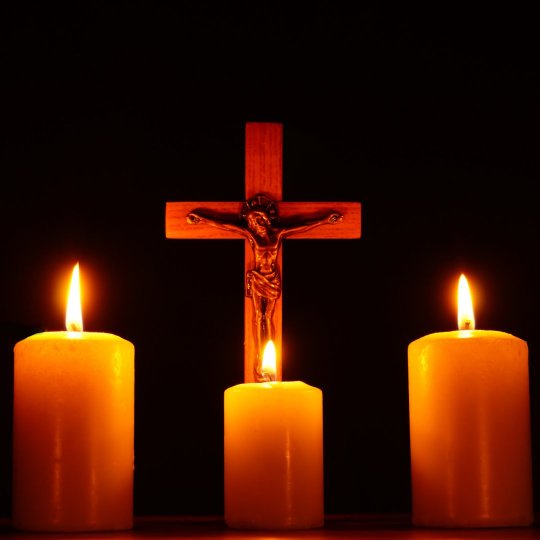
SAINTS OF THE DAY FOR June 05
Bl. Franciscan Martyrs of China, Twenty-nine Franciscans and Franciscan tertiaries who became victims of the Boxer Rebellion. They represent more than 100,000 Christians of China who were martyred in the reign of Empress Tz’u hsi. These martyrs are recorded as being slain in the palace of the viceroy of Taiyuan-fu of Xian-fu Province. The martyrs are: Bishop Gregory Grassie, Bishop Francis Fognolla, Father Elias Facchini, Father Theodore Balat, Father Franco Benedictine hermit.Feastday June 5
ST. BONIFACE, BISHOP AND MARTYR, APOSTLE OF GERMANY-St Boniface is known as the “Apostle of Germany” for having evangelised the peoples “beyond the Rhine” in the 7th century. His work provided the foundation for the political and social organization of Europe undertaken by Charlemagne.
St. Sanctinus. Also known as Sancho, a martyr. He was born in Albi, France, but was captured as a child by the Moors and sold into slavery at Cordoba, Spain. Raised and educated at the court of the emir of Cordoba, he served in the palace guard until tortured and executed for professing the Christian faith and refusing to embrace Islam. 851 A.D. Feastday June 5
St. Dorotheus of Gaza, Presbyter, (like a bishop) lived in a cave, doing penance. My ministry was to other monks and priests. The granddaughter of the Spaniard, St. Melania the Great, Melania the younger once gave me five hundred solidi. I shared the funds with the other brothers. I kept three solidi. The rest I gave to another anchorite, Diocles, to distribute to those needy. Feastday June 5
St. Eoban, 754 A.D. Benedictine monk and martyr of Irish descent, a companion of Sts. Willibrord and Boniface. Eoban was martyred with Boniface at Dokkum, Holland.
St. Tudno, 6th century. Welsh saint after whom Llandudno in Gwynedd, Wales, is named. He figures in various Welsh Christian legends.
0 notes
Text
RATTUS BEATUS

It is not much fun being a rat. Everyone hates rats. You lot burble on about universal love, but you are allowed to hate rats.
There is only one lovable rat in all of your literature – adorable Ratty in Wind in the Willows. And shall I tell you something? He is not a rat. He is a water vole – with a squat face, a stubby furry tail and ridiculous little ears. Pah!
You have made the very word…
View On WordPress
1 note
·
View note
Video
youtube
#Orthodox Christianity#Christianity#orthodoxy#repentance#Gregory Decapolite (youtube)#Abba Dorotheus of Gaza#Paradise#love#peace#humillity
1 note
·
View note
Quote
Consider well, brothers, how great is the power of humility. Consider how great is the spiritual energy behind saying, 'Pardon me'. Why is the devil called not only 'enemy', but also 'adversary'? He is called 'enemy' because he is a hater of men, one who hates what is good, a traitor; an 'adversary', because he always puts obstacles in the way of good. If someone wants to pray he puts obstacles in the way through evil suspicions, shameful thoughts, and spiritual torpor. If a man wants to give alms he obstructs it through avarice or procrastination. If a man wants to keep vigil he obstructs it with hesitations or laziness. In every single thing he is against us when we desire to do good. This is why he called the enemy and the adversary and why, by lowliness, all his attacks and devices are brought to nothing. Lowliness is really a great thing, for every kind of good is advanced by lowliness, and by working at it we cut short our journey, as it says, 'See my humility and my toil, and take away all my sins,' and 'I was humiliated, and the Lord saved me'! For humility alone can bring us into the spiritual life (as Abbot John used to say) even if slowly. Therefore, let us also be humble for a short time and we shall be saved.
St. Dorotheus of Gaza (Abba Dorotheus)
#orthodoxthoughts#orthodox#orthodoxy#eastern orthodox#orthodox christian#christian#christianity#Jesus Christ#ICXC#quote#orthodox quote#July 1#St. Dorotheus of Gaza#Abba Dorotheus#Discourses and Sayings
64 notes
·
View notes
Text
Humility: Let us take the example of trees
Let us take the example of trees. When they have much fruit the branches are bent downwards... The branch without fruit is raised up and grows upwards. In some kinds of tree's no fruit is produced as long as the branches grow upwards but if somebody takes a stone and binds it to a branch and pulls it down, then the branch will bear fruit. It is similar with a soul, when it humbles itself, it bears fruit and the more fruit it bears the humbler the soul becomes. The more the saints approach God, the more they see themselves as sinners.
I remember once when we were talking about humility and one of the leading lights of Gaza, heard us saying, "The more one approaches God the more one sees himself as a sinner." He was surprised, and said, "How is this possible?" Not knowing he wanted to learn the reason. I said to him, "...you who are the most important person here, how do you see yourself in this town?" He answered me saying, "I consider myself to be great and the first in the town." I said to him, "how do you see yourself when you go to Caesarea?" He replied, "There I see myself as insignificant amongst the important men of the town." Again, I said to him, "how do you see yourself when you go to Antioch?" He replied, "I see myself as a peasant." I then said to him, "When you go to Constantinople, near the Emperor, how do you see yourself?"
"I consider myself to be a beggar" he answered. After all this I said to him, "See [in the same way] this happens with the saints, the more they approach God, the more they see themselves as sinners." Thus, when Abraham saw the Lord he called himself "dust and ashes." Isaiah also said, "Woe is me for I am undone because I am a man of unclean lips." Likewise Daniel when he was in the lions den, and Habakuk brought him his meal saying "take the meal which God sent to you," replied, "did God remember even me?" You see what great humility he had in his heart when he was among the lions in the den, and they did not harm him not just once but twice; he was surprised and said, "Did God remember even me?" Do you see the humility of the Saints, how their hearts are moved?
-- Dorotheus of Gaza, Discourses and Sayings
#Orthodoxy#Orthodox#Humility#Triodion#Publican and Pharisee#Sunday#Gospel#Trees#fruits#God#saints#Dorotheus of Gaza
1 note
·
View note
Text

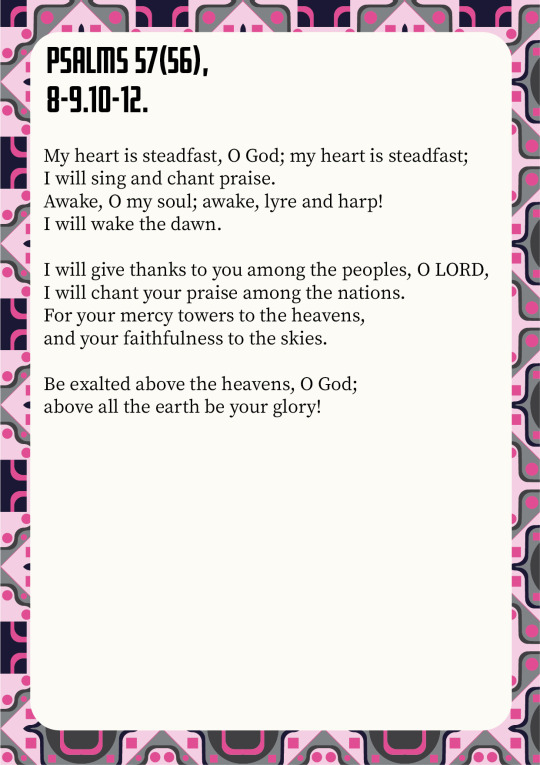

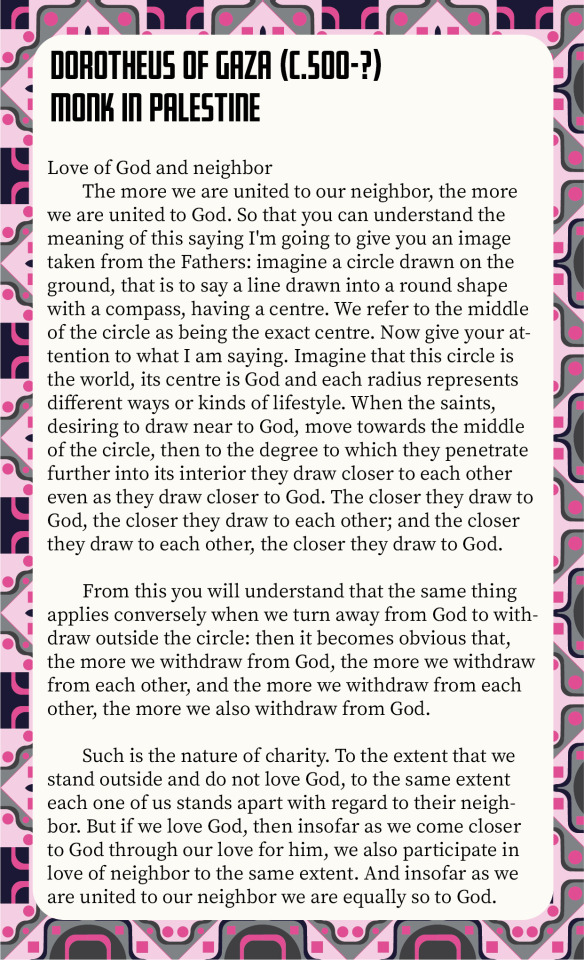
Readings for 20 May
20/05/2022
#Acts of the Apostles 15#Acts of the Apostles#Psalms 57(56)#Psalms#Holy Gospel of Jesus Christ according to Saint John 15#Holy Gospel of Jesus Christ according to Saint John#Dorotheus of Gaza (c.500-?)#Love of God and neighbor#God#Lord#Jesus#Holy Spirit#love#hope#heaven
1 note
·
View note
Photo
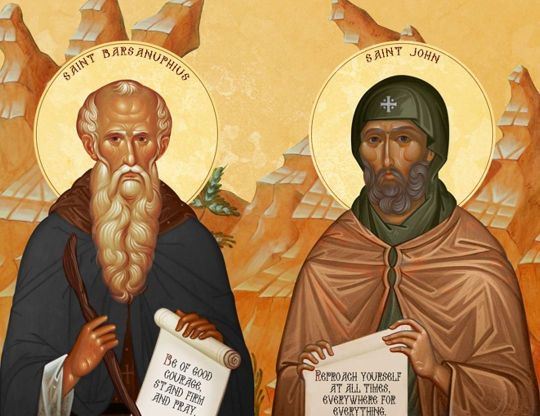
Today we also celebrate our Venerable Fathers Barsanuphius the Great and John the Prophet. Saint Barsanuphius and his disciple, Saint John the Prophet, struggled in very strict reclusion during the sixth century at the monastery of Abba Seridus at Gaza of Palestine, and were endowed with amazing gifts of prophecy and spiritual discernment. They are mentioned by Saint Dorotheus of Gaza, their disciple, in his writings. Many of the counsels they sent to Christians who wrote to them are preserved in the book which bears their names. Once certain of the Fathers besought Saint Barsanuphius to pray that God stay His wrath and spare the world. Saint Barsanuphius wrote back that there were "three men perfect before God," whose prayers met at the throne of God and protected the whole world; to them it had been revealed that the wrath of God would not last long. These three, he said, were "John of Rome, Elias of Corinth, and another in the diocese of Jerusalem," concealing the name of the last, since it was himself. May they intercede for us always + Source: https://www.goarch.org/chapel/saints?contentid=1967 (at Gaza,Palestine) https://www.instagram.com/p/CoS7tS9h-ec/?igshid=NGJjMDIxMWI=
6 notes
·
View notes